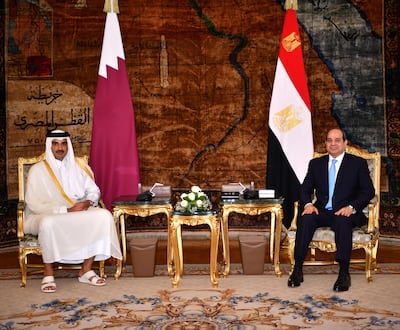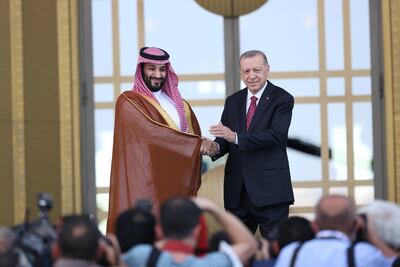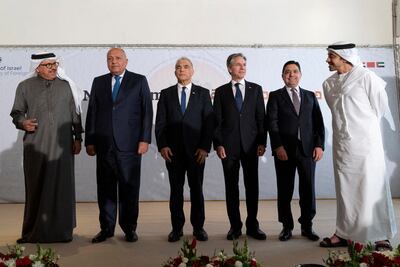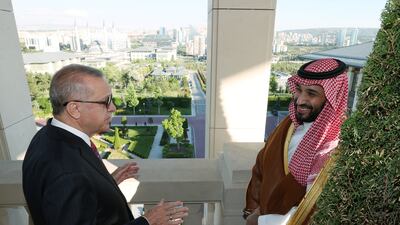A flurry of high-profile visits across the region in recent days, with countries mending fences amid official statements about an expanding US-sponsored military alliance, continue to reshape Middle East geopolitics.
The region is buzzing with new diplomatic undertakings and complex geopolitical tension as it eagerly anticipates a visit by US President Joe Biden later this month.
In his first trip to Egypt since 2015, Qatar's Emir Sheikh Tamim was welcomed by President Abdel Fattah El Sisi in Cairo on June 25.

The two Arab leaders met in August last year at a summit in Baghdad. That gathering was also attended by Sheikh Mohammed bin Rashid, UAE Vice President and Ruler of Dubai, and leaders and foreign ministers from Saudi Arabia, Turkey, Kuwait, Jordan and Iran.
“President Abdel Fattah El Sisi affirms that the visit of Emir Tamim embodies the progress witnessed by the Egyptian-Qatari relations,” Egyptian Presidency spokesman Bassam Rady said on his official Facebook account.
On Sunday, Iraqi Prime Minister Mustafa Al Kadhimi visited Tehran, a day after travelling to Jeddah, in a bid to revive talks between Saudi Arabia and Iran.
On Tuesday, UAE National Security Adviser Sheikh Tahnoun bin Zayed met Qatar's emir in Doha.
It was Sheikh Tahnoun's second visit since Saudi Arabia, the UAE, Bahrain and Egypt ended their dispute with Qatar in January last year. The disagreement had led to a severing of ties with Doha in 2017.
With the world emerging from Covid-19 disruption and entering into a period of economic downturn, while dealing with Russia’s invasion of Ukraine and a global food crisis, as well as a wide variety of national-level political crises, many of the Middle East’s long-standing lines of division are being challenged, says Charles Lister, a senior fellow at the Washington-based Middle East Institute.
“To a large extent, dialogue has taken the place of confrontation — but I’d describe that as exploratory rather than truly transformational at this point,” he told The National.
“One would hope that proliferating lines of dialogue bring a greater sense of calm but there’s no denying that many of the underlying tensions remain. You can’t deal with a deep trauma with Band-Aids, it’ll take a lot longer and deeper engagement to resolve the deeper root causes of regional instability — but a start is a start.”
Last week, Saudi Crown Prince Mohammed bin Salman visited Turkey and was given a warm welcome by President Recep Tayyip Erdogan to “his second country”, Turkish and Saudi Arabian state media reported.
Both nations were "determined to start a new period of co-operation”, the two countries said in a joint statement after the meeting in Ankara. "The talks reflected the depth of the perfect relations."
Prince Mohammed was reciprocating a gesture by Mr Erdogan, who visited Saudi Arabia in April, in a step towards mending fences between the two regional powers.
The visit came six months after the Saudi crown prince held talks with Sheikh Tamim in Doha on his first visit to Qatar since the Gulf crisis began in 2017.

“Sheikh Tamim’s an amazing person,” Prince Mohammed told the US magazine The Atlantic in an interview in March.
Asked about the previous dispute, Prince Mohammed said it was “a fight between brothers” and that the relationship is now “better than ever in history”.
The recent diplomatic activity and multi-leg tours by leaders of Middle East heavyweights are picking up steam to lay the groundwork for Mr Biden's visit to the region, analysts say.
The US president's first stop on the trip from July 13 to July 16 will be Israel, followed by the occupied West Bank before he travels to Saudi Arabia, where he will meet King Salman and Prince Mohammed.
Different allies of the US have different messages to send to Mr Biden, says Dr H A Hellyer, Carnegie Endowment scholar, senior fellow of the Royal United Services Institute in London and the University of Cambridge, and a columnist for The National.
“Particularly in the Gulf, American allies are keen to get reassurances from DC that the latter can be depended on for upholding the regional security architecture, which has relied on America for decades,” he told The National.
“At the same time, I don’t get the impression that GCC [Gulf Cooperation Council] capitals are necessarily going to trust those reassurances if they are forthcoming anyway. Since the Obama administration, there has been a lot of dissatisfaction from these capitals with regards to American support.”
As tension has built in recent years over Tehran's nuclear programme, as well as its missile and drone scheme, Saudi Arabia, the UAE and northern Iraq have come under drone or missile strikes that were claimed by or blamed on Iranian-backed militias in Yemen and Iraq.
The departing Israeli Defence Minister Benny Gantz this month said Israel was building a US-sponsored regional air defence alliance, an effort he suggested could be boosted by Mr Biden's visit.
Mr Gantz unveiled the military partnership at a Knesset hearing on June 20 and said it was already active.
“This programme is already operative and has already enabled the successful interception of Iranian attempts to attack Israel and other countries,” he said.
Mr Gantz did not mention which countries were involved and regional heavyweights have not commented on his statements.
Israel established ties with the UAE, Bahrain and Sudan, as well as re-establishing relations with Morocco, since 2020 in landmark agreements that helped reshape Middle East geopolitics and political alignment.
In March, the leading politicians from the US and the four Arab countries convened in Israel to build commercial and security ties.
The departing Israeli Foreign Minister Yair Lapid last month said the Israeli-hosted summit with Arab partners would become a regular event.

The pro-US regional players are trying to form new regional alliances and establish a new regional security architecture in anticipation of a continuing reduction of US involvement in the Middle East as the Biden administration is preoccupied with the Russian-Ukraine war and China, and in preparation for dealing with the outcome of Iran’s nuclear negotiations with the US, analysts say.
“The biggest source of tension remains Iran and its nuclear status," said Mr Lister, who is also director of the Countering Terrorism Programme at the Middle East Institute. "With Qatari facilitation, we may still have a glimmer of hope for a new multilateral accord, but without one, all bets are off."
The long-standing standoff between Iran and the US adds another ingredient to the complicated and changing political landscape in the region.
Tweets and official statements made by the Americans and the Iranians on their reasoning behind the stalemate have sputtered down to indirect, unfruitful talks in Qatar this week, with both sides acknowledging that the main EU-sponsored negotiations have faltered but are not dead yet.
“To assert more stability and deterrence into that unpredictable equation would require a more assertive US posture than we’ve seen over the last couple years but with US domestic politics being where they are, that’s far from guaranteed,” said Mr Lister.









